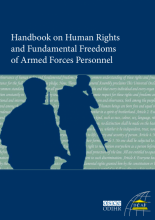Handbook on Human Rights and Fundamental Freedoms of Armed Forces Personnel
Chapter 10 of the Handbook deals with conscientious objection to military service in detail. It summarises the following best practices and recommendations:
• Information should be made available to all persons affected by military service about the right to conscientious objection to military service, and the means of acquiring conscientious-objector status;
• Conscientious objection should be available both for conscripts and for professional soldiers both prior to and during military service, in line with the recommendations of international bodies;
• Where a state does not accept a statement of conscientious objection at face value, there should be independent review panels (or where not independent, adequate procedural safeguards should be in place);
• Conscientious objectors should not be subject to repeated punishment for failure to perform military service;
• There should be no discrimination against conscientious objectors in relation to their terms or conditions of service, or any economic, social, cultural, civil, or political rights;
• Alternative service should be compatible with the reasons for the conscientious objection, of a non-combatant or civilian nature, in the public interest and not punitive;
• Alternative service should be performed under a purely civilian administration, with no involvement by the military authority;
• Those performing alternative service should enjoy the same economic and social rights as those undergoing military service;
• The duration of alternative service should be no more than 1 1/2 times the length of military service.
Source: http://www.osce.org/odihr/31393

Add new comment